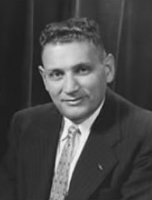Solomon Kullback
Solomon Kullback (born April 4, 1907 in Brooklyn , New York , † August 5, 1994 in Boynton Beach , Florida ) was an American mathematician ( statistics ) and cryptologist .
Kullback attended Boys High School in Brooklyn and studied at City College of New York . He then taught mathematics in New York, but like his school friend Abraham Sinkov was dissatisfied with it and applied as a mathematician for the civil service. They were accepted by William Friedman in 1930 for the Signals Intelligence Service (SIS). Together with Frank Rowlett they were trained as cryptographers in Washington, DC, partly using the archives of the previously closed Black Chamber . Sinkov, Kullback and Rowlett were the first three mathematicians of the later NSA after Friedman. In addition, Kullback received his doctorate in 1934 under Frank M. Weida at George Washington University (An Application of Characteristic Functions to the Distribution Problem of Statistics), where he also gave evening courses in mathematics from 1939.
In the 1930s, the SIS mostly only worked on its own communication security (COMSEC). Like Sinkov, he was involved in the creation of code books for the US Army, using the throwing of card games as a random element. In addition, they tested commercial offers from encryption machines , but they were mostly able to " crack " them. However, Kullback and Frank Rowlett (who had also been recruited in 1930) began to break into Japanese diplomatic communications from 1936, which was encrypted with machines ( code name Red ). From the deciphered messages, the USA received indications of war preparations by the Axis powers . The funding of the SIS was then increased.
In May 1942, Kullback worked as a major in Great Britain, where he exchanged views with the British and worked successfully on the deciphering of German codes . Upon his return, he headed the Japan department.
After the war he became head of research and development at the NSA, which was founded in 1952, and was primarily responsible for the use of computers for his own new encryption methods. The other cryptologists recruited by Friedman in 1930 also held senior positions: Sinkov for communications security (COMSEC) and Rowlett for cryptanalysis .
In 1962, Kullback retired from the NSA and became a professor at George Washington University specializing in statistics. The Kullback-Leibler divergence is named after him and Richard Leibler , one of the fundamental definitions in information theory with applications in statistics and machine learning .
literature
- Solomon Kullback , Statistical Methods in Cryptanalysis. Aegean Park Press, Laguna Hills 1976 - ( ISBN 0-89412-006-9 )
- Solomon Kullback , Information Theory and Statistics. Dover Publications, New York 1959 - ( ISBN 0-48669-684-7 )
- RD Farley, HF Schorreck , Oral History Interview with Solomon Kullback. Declassified NSA Internal Document, 1982. ( Online )
Web links
- CV (English)
| personal data | |
|---|---|
| SURNAME | Kullback, Solomon |
| BRIEF DESCRIPTION | American mathematician and cryptologist |
| DATE OF BIRTH | April 4, 1907 |
| PLACE OF BIRTH | Brooklyn , New York |
| DATE OF DEATH | 5th August 1994 |
| Place of death | Boynton Beach , Florida |

